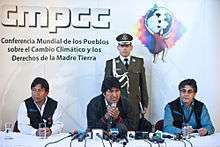World People's Conference on Climate Change
The World People's Conference on Climate Change and the Rights of Mother Earth was a global gathering of civil society and governments hosted by the government of Bolivia in Tiquipaya, just outside the city of Cochabamba on 19-22 April 2010.

Description
The event was attended by around 30,000 people from over 100 countries,[1] and the proceedings were transmitted live online by OneClimate and the Global Campaign for Climate Action (GCCA).[2] The conference was viewed as a response to what some termed failed climate talks [3] in Copenhagen during the 15th United Nations Conference of Parties (COP15) climate meetings in December 2009. There have been claims after the Conference ended that there were flaws in its organization and that the Venezuelan government funded it partially.[4]
One of the important objectives[5] of the conference was to produce proposals for new commitments to the Kyoto Protocol and projects in the lead-up to the next UN climate negotiations scheduled during the COP16 meeting in Cancun, Mexico in December 2010.
Conference topics included[5] a Universal Declaration on the Rights of Mother Earth (see external links below), a World People's Referendum on Climate Change, and the establishment of a Climate Justice Tribunal.
The World People's Conference on Climate Change and the Rights of the Mother Earth resulted in a People's Accord.
See also
- List of environmental topics
References
- Schipani, Andres (23 April 2010). "Grassroots summit calls for international climate court". The Guardian. ISSN 0261-3077. Retrieved 6 August 2019.
- "is a new social networking space for sharing ideas and experiences on climate change". Oneclimate.net. 13 April 2010. Archived from the original on 2 July 2010. Retrieved 12 September 2010.
- Vidal, John; Goldenberg, Suzanne; Stratton, Allegra (18 December 2009). "Low targets, goals dropped: Copenhagen ends in failure | Environment | guardian.co.uk". London: Guardian. Retrieved 12 September 2010.
- Archived 3 April 2010 at the Wayback Machine
Further reading
- "Why did Copenhagen fail to deliver a climate deal?", "BBC", 22 December 2009.
- Kope, Jerry. "Climate 2010: An Exclusive Conversation With Kumi Naidoo, Executive Director of Greenpeace" "Huffington Post", 31 March 2010.
- By John Vidal, Allegra Stratton and Suzanne Goldenberg. "Low targets, goals dropped: Copenhagen ends in failure", "The Guardian", 19 December 2009.
- "Information Guide", World People's Conference on Climate Change and the Rights of Mother Earth official website. Retrieved 8 April 2010.
- Spaces for Movement? Reflections from Bolivia on climate justice, social movements and the state, Building Bridges Collective. Retrieved 29 August 2010.
External links
| Wikisource has original text related to this article: |